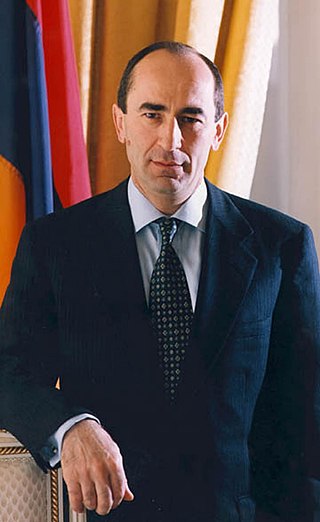
Robert Sedraki Kocharyan is an Armenian politician. He served as the President of the Nagorno-Karabakh Republic from 1994 to 1997 and Prime Minister of Nagorno-Karabakh from 1992 to 1994. He served as the second President of Armenia between 1998 and 2008 and as Prime Minister of Armenia from 1997 to 1998.

The Armenian Revolutionary Federation, also known as Dashnaktsutyun, is an Armenian nationalist and socialist political party founded in 1890 in Tiflis, Russian Empire by Christapor Mikaelian, Stepan Zorian, and Simon Zavarian. As of 2023, the party operates in Armenia, Lebanon, Iran and in countries where the Armenian diaspora is present. The party was also active in Artsakh until the Azerbaijani offensive in September 2023. Although it has long been the most influential political party in the Armenian diaspora, it has a comparatively smaller proportional presence in modern-day Armenia. As of October 2023, the party was represented in two national parliaments, with ten seats in the National Assembly of Armenia and three seats in the Parliament of Lebanon as part of the March 8 Alliance.

The United Labour Party (ULP) is a social-democratic political party in Armenia. It is led by Gurgen Arsenyan.

Levon Hakobi Ter-Petrosyan, also known by his initials LTP, is an Armenian politician and historian who served as the first president of Armenia from 1991 until his resignation in 1998.

Mighty Fatherland, also known as Mighty Homeland or Powerful Homeland is a political party in Armenia. The founder of the party was Vardan Vardapetyan, but since 2006 has been led by the vice-chairman of the party, Shirak Torosyan. Torosyan is also the President of the Javakhk Patriotic Union.
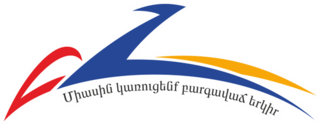
Prosperous Armenia Party, is a conservative political party in Armenia. It was founded by businessman Gagik Tsarukyan on 30 April 2004, when the constituent congress of the party took place.

Nikol Vovayi Pashinyan is an Armenian politician serving as the prime minister of Armenia since 8 May 2018. A journalist by profession, Pashinyan founded his own newspaper in 1998, which was shut down a year later for libel. He was sentenced for one year for defamation against then Minister of National Security Serzh Sargsyan. He edited the newspaper Haykakan Zhamanak from 1999 to 2012. A supporter of Armenia's first president Levon Ter-Petrosyan, he was highly critical of second president Robert Kocharyan, Defense Minister Serzh Sargsyan, and their allies. Pashinyan was also critical of Armenia's close relations with Russia, and promoted establishing closer relations with Turkey instead. He led a minor opposition party in the 2007 parliamentary election, garnering 1.3% of the vote.

Presidential elections were held in Armenia on 22 September 1996. The result was a victory for Levon Ter-Petrosyan, who received 51% of the vote. Turnout was 60%.

The Armenian National Congress is an Armenian political party led by former president Levon Ter-Petrosyan and was formed in 2008. Its direct predecessor was the Pan-Armenian National Movement. It is often abbreviated as ՀԱԿ or HAK, in keeping with its Armenian spelling, but it is occasionally referred to as the ANC in English, including on its official website.

The 2011 Armenian protests were a series of civil demonstrations aimed at provoking political reforms and concessions from both the government of Armenia and the civic government of Yerevan, its capital and largest city. Protesters demanded President Serzh Sargsyan release political prisoners, prosecute those responsible for the deaths of opposition activists after the 2008 presidential election and institute democratic and socioeconomic reforms, including the right to organise in Freedom Square in downtown Yerevan. They also protested against Yerevan Mayor Karen Karapetyan for banning the opposition from Freedom Square and barring vendors and traders from the city streets. The opposition bloc Armenian National Congress, which has played a major role in organising and leading the demonstrations, had also called for a snap election and the resignation of the government.

Presidential elections were held in Armenia on 18 February 2013. In the run-up to the elections, Armenia's first president Levon Ter-Petrosyan and Gagik Tsarukyan, leader of the second largest parliamentary party Prosperous Armenia, withdrew from the race in December 2012. Many believed that no candidate would be able to challenge incumbent president Serzh Sargsyan, others stated that people see "absence of alternatives" and these factors caused great apathy among the public.

Yerevan City Council election was held on May 5, 2013. The Republican Party of Armenia won 56% of the total vote, Prosperous Armenia had 23%, while Barev Yerevan won over 8%. The opposition parties and the local observers denounced the elections as "unfair".

Parliamentary elections were held in Armenia on 2 April 2017. They were the first elections after a constitutional referendum in 2015 that approved reforms for the country to become a parliamentary republic. The result was a victory for the ruling Republican Party of Armenia, which won 58 of the 105 seats in the National Assembly.

A constitutional referendum was held in Armenia on 6 December 2015. Its amendments to the constitution put the country on a course from having a semi-presidential system to being a parliamentary republic, with the changes beginning to take place during the 2017–18 electoral cycle. The referendum passed with 66% of voters supporting it. Voter turnout was 51%, passing the 33% threshold to validate the results.

Snap parliamentary elections were held in Armenia on 9 December 2018, as none of the parties in the National Assembly were able to put forward and then elect a candidate for Prime Minister in the two-week period following the resignation of incumbent Prime Minister Nikol Pashinyan on 16 October. They were the first elections after the 2018 revolution and the country's first-ever snap elections.
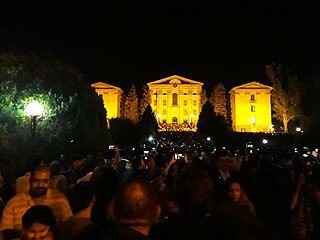
On 2 October 2018, protest demonstrations demanding the dissolution of the National Assembly of Armenia were held in the capital city of Yerevan and at other locations in Armenia. The protests were a response to a vote by the National Assembly to block Prime Minister Nikol Pashinyan from disbanding the legislature and holding an election. In the evening, the prime minister's supporters gathered at Marshal Baghramyan Avenue, Baghramyan and Karen Demirchyan streets and blockaded the National Assembly building. After endorsement by Pashinyan, protest rallies were also launched at Vanadzor and Gyumri.
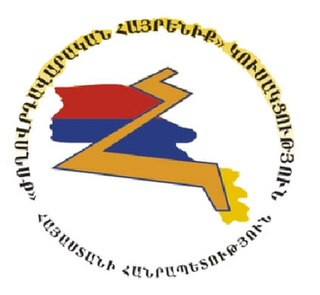
The Democratic Homeland Party is an Armenian political party. The Chairman of the party is Petros Makeyan.
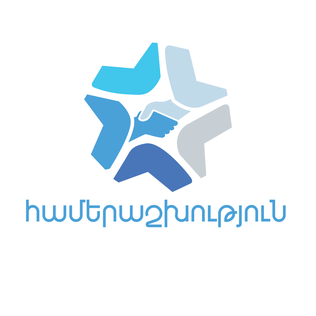
The Solidarity Party is an Armenian political party.

The Balasanyan Alliance Social Party, also known as the Balasanyan Alliance is an Armenian political party.
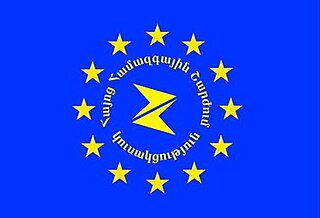
The Armenian National Movement (ANM) is a political party in Armenia. It is led by Ararat Zurabyan, the former chairman of the Pan-Armenian National Movement and a former member of the Free Democrats.



















